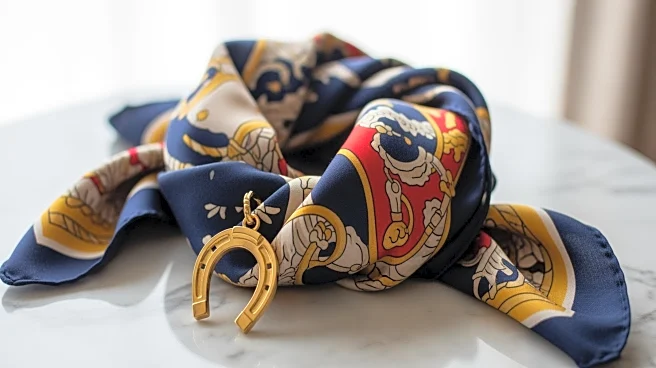What's Happening?
Hermès has reported a 7% increase in revenue for the first half of 2025, reaching €8 billion, despite facing macroeconomic uncertainties and tariffs. The brand's focus on craftsmanship, scarcity, and heritage
has allowed it to avoid aggressive marketing and pricing competition. Hermès continues to defy the trend of financial squeezes affecting other luxury retailers, maintaining strong year-on-year growth in both revenue and profitability. The company attributes its success to its distinctive operating model, which emphasizes high margins, growth, and value creation for shareholders.
Why It's Important?
Hermès' ability to maintain growth during economic downturns highlights the resilience of its business model, which prioritizes exclusivity and craftsmanship. This approach not only shields the brand from market volatility but also reinforces its position as a leader in the luxury segment. As other luxury retailers face insolvencies and declining sales, Hermès' strategy of limited production and high-quality offerings continues to attract affluent consumers who view its products as investment-worthy. The brand's success serves as a case study for luxury businesses aiming to navigate economic challenges while preserving brand equity.
What's Next?
Hermès faces potential challenges, including an antitrust lawsuit in the US concerning the exclusivity of its Birkin bag distribution and growing regulatory demands in Europe for sustainability transparency. How the brand navigates these legal and environmental pressures will be crucial for maintaining its market standing. Additionally, Hermès plans to expand its production capacity by opening new workshops, which will help meet sustained demand for its iconic products.
Beyond the Headlines
Hermès' strategic focus on craftsmanship and scarcity not only drives its financial success but also contributes to its cultural significance as a symbol of luxury and exclusivity. The brand's commitment to artisanal production and heritage preservation sets it apart in an industry often driven by trends and mass production. This approach not only enhances its appeal among ultra-wealthy consumers but also positions Hermès as a benchmark for sustainable luxury practices.










